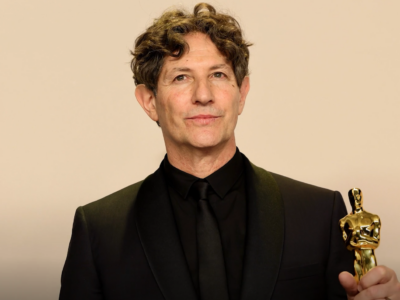Elysium, a movie set in the year 2155 starring Matt Damon and Jodie Foster, takes a stab at the health care system in the United States, but it also offers an insight into the country’s immigration system if comprehensive reform takes place—sort of. [Warning: This article may contain some spoilers.]
The film, directed by Neill Blomkamp, takes place on a state-of-the-art space habitat called Elysium in an overpopulated and ravaged planet Earth.

Matt Damon in his leading role on “Elysium.” Photo taken from YouTube.
Elysium centers its focus on a former convict named Max (Damon), whose deplorable health condition forces him to seek the services of a criminal political leader who also wants to get a hold of Elysium’s exceptional health care resources in order to find a cure for ailing earth inhabitants. Nevertheless, they will face Elysium’s rogue Secretary of Defense Delacourt (Foster), who relentlessly keeps inhabitants (or as the movie calls them, “illegals”) from entering Elysium at all costs.
At the beginning of the movie, a space ship carries a large number of immigrants in an attempt to enter Elysium, to which Delacourt orders a merciless takedown. Albeit not in the same fashion, law enforcement has been an important component in the passage of S.744 bill on June 27, 2013, so as to halt immigration influx at the border.
As Elysium unravels, one would think that the main reason these “illegals” want to flee planet Earth for a more comfortable life in Elysium is paralleled to the reason why many immigrants decide to cross the border and find a better life in the United States (of course, the U.S. being the “Elysium” for all hopeful immigrants overseas).
The movie also shows that immigrants go to Elysium to find better health care, but they need to become Elysium citizens in order to enjoy it. In real life, many undocumented immigrants face the same problem, as they don’t have access to health care.
Before entering into the weeds of immigration discussion, blogs such as ThinkProgress explain that Elysium falls short in explaining why health care in the spatial satellite is better than on Earth:
“But Elysium falls apart the more you think about it–and fails in its mission to speak truth to power–because of its inability to explain a simple question: why is health care scarce on Earth in the world of Elysium? The movie shows us many ways that life in Elysium is more comfortable and satisfying than life on earth, but Blomkamp focuses his camera narrowly on people on Earth who want to get to Elysium mainly for access to medical pods that can cure even grave illnesses with a single, quick scan.”
ThinkProgress goes on to say:
“And at the conclusion of the movie, they get it. After Spider and Max download a program into the Elysium mainframe that makes everyone on Earth a citizen, and thus able to be scanned by the devices, shuttles full of the pods take off for Earth where people of all races, genders, and creeds flock to make use of them. It’s not as if there’s a medical device scarcity. There could be other reasons that health care is restricted, but it’s not particularly made clear in the movie what those motives might be.”
Applying the latter paragraph to real life, one can imply that legalizing the immigration status of 11 million people in the United States will ensure a better quality of life for them. As the Immigration Policy Center points out:
Including legal immigrants in the health care system not only strengthens the system, but is a critical part of their integration into U.S. society. In addition to working, paying taxes, and learning English, legal immigrants should be able to pay their fair share and have affordable health care like everyone else.
When asked whether the film depicts what human conditions will be like in 140 years, Blomkamp answered: “No, no, no. This isn't science fiction. This is today. This is now.” In terms of immigration, Blomkamp may not be that far from the truth.
The movie opens with younger Max envisioning a life in Elysium while his caring nun explains to him that his life is destined for a greater purpose—all this spoken in Spanish.
Elysium paints the United States as a country that has been overtaken by Latinos and whose de jure language is Spanish, when signs in local offices and factories contain larger Spanish-written signs and law enforcement referred to as “Policía.”
Many experts consider that by the year 2050, Hispanics and other communities of color will become America’s largest group, so we won’t have to wait till 2154 to see this come true. Perhaps by opening a roadmap to citizenship to all hopeful U.S. residents, rather than seeing a grim planet Earth (or in this case, the U.S.) we will see a boon in years to come.
Lastly, one thing we can also draw from the movie is that no society, as perfect as it intends to be, can turn a blind eye on its inhabitants and their needs –and approaching the case of immigration is the first step towards understanding human stories.







10 comments
Robert’s conclusion, that “no society, as perfect as it intends to be, can turn a blind eye on its inhabitants and their needs,” raises a critical question. Does a nation have a right to restrict its inhabitants to those born there or entering legally? If your answer is that nations don’t have such right of restriction, then any country successfully governing itself will attract new entrants and an obligation to provide care. Failing governments won’t be pressured to reform, as unhappy residents will leave for better environments. Over time, new entrants to a successful nation may bring with them a different view of governance, transforming their new host nation in a way that original inhabitants may believe no longer resembles their nation. This leaves these original inhabitants searching for a new home or feeling ostracized in the only home they have every known and which they would not have chosen to leave. I raise this question despite believing that the U.S. needs to reform our immigration system and allow for more legal immigration.
I believe that if Americans trusted that our government would finally secure our borders enough that legal immigration became the primary method of entry and assimilation (while still ensuring immigrants could respect and honor their heritage culture), paths to citizenship for “inhabitants” who entered or stayed illegally could quickly be found. When now-resigned Homeland Security Secretary Janet Napolitano made the ridiculous assertion earlier this year that America’s borders are already secure, she reinforced fear that our current government has no intent to take this issue seriously. I’m open to debate on this, so let me know if you believe my thinking is flawed.
The current bill that was passed in the Senate regarding the immigration issue (and was rejected by the House) included provisions to complete the wall along our southern border. However, due to the 2007-2008 economic collapse and other factors, the influx of hundreds of thousands of immigrants into the US across that porous border has slowed to a relative trickle. The wall itself would be unnecessary IF employers were strictly enjoined from hiring illegals and if, as on Elysium, only citizens had access to the amenities. However, that opens up the moral issue of denying health care to those who need it.
I agree that most, but not all, of the people in the U.S. illegally come for economic reasons so the eVerify system and strict penalties for employing illegals would reduce illegal immigration substantially. You are also right that our recent economic downturn has reduced economic incentives to come to the United States. There is, however, a small, but important group of illegals who come to hurt the United States, as drug distributors, terrorists, even spies. Border security is important to prevent these people from entering, as well as for weeding them out if they get in.
As for your comment on the moral issue of health care denial, this is a tough issue. If people who have chosen a government or been fortunate enough to be born into a government that adopts the right policies and freedoms to promote prosperity, those individuals will live better lives than those in poorly governed nations. If the people in successful nations then have a moral obligation to give their wealth away for health care, food, water and other necessities and even wants to others, the only end to this demand is when all people have equality in everything they receive. When this outcome is mandated, we’ve seen that all of society suffers as hard work and innovation no longer receive additional reward. At a nation-state level, poor governments aren’t punished for terrible decisions as they can demand help from wealthier nations to offset their ineptitude if we treat too many human expectations as moral obligations.
Having said this, helping others is important, and Americans have always done this more than almost every culture voluntarily. Most (thought certainly not all) Americans will be generous when their generosity is voluntary — in part because it makes people feel good to help others. So creating a society that encourages generosity is critical, but as government forces generosity with none of the psychic rewards we again reduce incentives to work hard and innovate. It’s a tough balancing act. I don’t think we’ve hit the mark yet.
The border security is mostly in place right now to keep illegal immigration in check. However, as you indicate, the bigger danger to our country is from terrorists and drugs. An ancillary issue is the dissemination of guns to those drug cartels south of our border AND to drug gangs and street gangs within our borders. The NRA and the gun industry have around the country taken steps to assure that guns get into the gangs inside those large cities that have strict gun regulations. In Chicago, which has ordinances prohibiting the sale or possession of handguns inside the city, the gun purveyors established dozens of gunshops just outside the city limits, and have encouraged their licensed dealers to assist straw buyers. This has been going on for much longer than just prior to the shootings at Columbine in 1999, for the guns in the possession of both boys were obtained legally by “straw” buyers.
Our Constitution AND the UN Universal Declaration of Human Rights clearly state that the rights that we so freely enjoy in this country are the rights of ALL people. During the first year of his presidency, George W. Bush attended a meeting of world leaders in Mexico, the purpose being to deal with the world-wide issue of poverty. Bush pledged at that meeting to put into the pot an amount less than 1% of our GDP to alleviate poverty, a pledge he never honored. He did virtually nothing during his entire administration to ease the situation in Palestine/Israel, which made it easier for those in the Middle East who already despise the US to continue doing so.
Tens of millions were donated by generous Americans to the relief of Haiti after their disaster a few years ago. However, their capital city is still inundated by tent cities of those who have yet to receive any assistance. While that is not the fault of the US (many prominent Americans have contributed time and money to improve this situation), it is still the moral obligation of all of us to assure that the less fortunate do not live in constant fear of the next minute, of the next meal, of the next monsoon. Both Muslim and Christian traditions are full of requirements for us to help those who need help – it is one of the five main pillars of Islam. Unfortunately, as is becoming all too clear, religion today is NOT what it was just a few decades ago, something that is evident in the clear fact of disaffection among Christians and Muslims. Churches have become too engrossed with this world, and in trying to control it. Fundamentalism in BOTH Christian AND Muslim communities is converting faith into doctrine and belief into greed. Governments are capitalizing on ignorance to generate hatred based upon their interpretation of religious creeds, and powerful groups in our own society are doing the same. To paraphrase Robin Meyers, Jesus has been removed from Christianity.
I do not advocate mandatory giving. I DO advocate a reasonable assessment of the issues facing our society, based upon verifiable facts from reliable sources. As you so eloquently indicate, REQUIRING people to give is not appropriate. The spirit of true giving is not enhanced through coercion, but through altruism.
Elysium is not entertainment, its propaganda; its clear that this movie was created primarily with the intention of promoting immigration.
More like wealth equality. There is very little being said in the movie regarding immigration, since it is prohibited, period.
Immigration is a human rights problem that no one wants to touch. Most countries deploy national, racial and social profiling on immigrants. Some, more than others.
The problem about immigration is the profiling, not the immigration itself.
A person willing to donate/invest $10Bn in a country should not be able to travel and enter a country any easier than any other immigrant, refugee or not.
And remember, travel is a human right too, so, basically we’re talking open borders if we want to remove most sources of misery in the world.
But currently, none of the governments in the world, have systems designed to handle any notable amount of immigration at all.
It’s a fundamental issue that needs to be solved, not fought about.
I am sure the flood of immigrants to Elysium won’t over-run the resources while contributing little to society to keep such a system going. Sure, free health care, great houses, beautiful landscaping, lavish pensions and a host of other benefits to people that have no way possible to pay for these services can go on forever… SIGH. I am sure we could also build such a utopian society is supposed to go on for ever and ever and ever lavishing 1st world benefits on immigrants that have limited language skills, poor education and large families they can not support, less pay any meaningful taxes. But don’t worry… it’s Hollywood, that also gives us Fantasy Island, Peter Pan and Mickey Mouse.
I think the big reason the healthcare on Elysium is NOT available on earth is simply that the wealthy control ALL production and dispersion of the required apparatus, even though It is obvious that everything is made back here on earth, an earth that, if we continue on our current path, will be just as polluted and barren as the one portrayed in “Elysium” and which will be ruled by an uncaring elite, just as on “Elysium”.